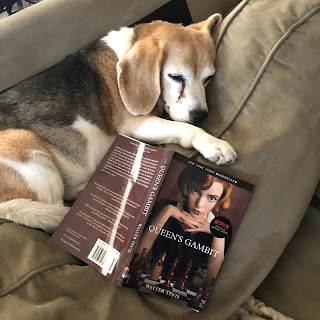Saturday, March 27, 2021
Ruth Ware, ONE BY ONE
A contemporary take on the Agatha Christie classic AND THEN THERE WERE NONE (1939) in which eight people arrive on a desert island and are met by the butler and housekeeper, after which they are murdered one by one. In Ware's version, ten people on a company retreat arrive at a luxurious ski chalet in the French alps and are met by the cook and housekeeper; shortly afterward an avalanche cuts off all communication, rendering the place a virtual island. One by one, the guests disappear and/or die. Like Ware's other books, this hits its target of being a quick, easy-to-read thriller. I must confess, I guessed the killer about half-way through, partly because the story is told in chapters with alternating narrators. The fact that the company is a tech startup aimed at connecting people through music was a nice touch, when the murders depend upon people becoming separated.
Thursday, March 25, 2021
Walter Tevis, THE QUEEN'S GAMBIT
After watching the superb NETFLIX adaptation of this book, I was curious about the book. The adaptation adheres very closely to the novel, with the exception of building more backstory than Tevis gives us; the scenes between Beth and her mother, in particular, are developed more fully than in the book. For those who have not seen the NETFLIX version, it's a great read, with spare, direct prose, and a quick pace. I had already seen the end of the series, and I knew how it ended, and I STILL found myself racing through the last quarter of the book, in a good way. That's a measure of the suspense Tevis builds into the story.
That said, when I went back and reread sections (when I wasn't reading for plot), I realized (to my great enjoyment) how subtly Tevis had woven in some suggestive, nuanced themes. For example, here are the opening lines: "Beth learned of her mother's death from a woman with a clipboard. The next day her picture appeared in the Herald-Leader. ... A legend under her picture read: 'Orphaned by yesterday's pile-up on New Circle Road, Elizaeth harmon surveys a troubled future.'" So from the first lines, he suggests that Beth apprehends her life not as her own lived experience but mediated through the eyes of others, through words and photographs about her, and in the company of someone with a [clip]board. The plot propels the story along, but it was with pleasure that I went back to the beginning and thought about chess as the central metaphor, with all its multiple meanings. I'll be adding his other books to my TBR.


